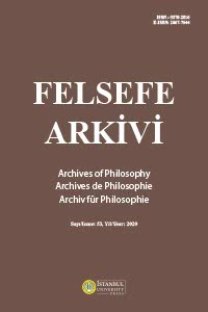Bilimde Değerlerin Rolü Işığında Bilime Güven
bilim ve değerler, bilime güven, tümevarımsal risk, epistemik risk
Trust in Science in Light of the Role of Values in Science
Science values in science, trust in science, inductive risk, epistemic risk,
___
- Anlı, Ömer Faik. “Bilim Sosyolojisi Bağlamında Bilimin Dışsal Belirleyenleri Olarak Değerler.” Muhafazakar Düşünce Dergisi 9, no. 36 (2013): 77—99. google scholar
- Betz, Gregor. “In Defence of the Value Free Ideal.” European Journal for Philosophy ofScience 3, no. 2 (2013): 207-20. google scholar
- Biddle, Justin B., ve Rebecca Kukla. “The Geography of Epistemic Risk.” Exploring Inductive Risk: Case Studies of Values in Science, Derleyenler Kevin Christopher Elliott ve Ted Richards, 215-37. New York: Oxford University Press, 2017. google scholar
- Boulicault, Marion, ve S. Andrew Schroeder. “Public Trust in Science: Exploring the Idiosyncrasy-Free Ideal.” Social Trust, Derleyenler Kevin Vallier ve Michael Weber, 102-21. New York, NY: Routledge: Routledge, 2021. google scholar
- Douglas, Heather. “Inductive Risk and Values in Science.” Philosophy ofScience 67, no. 4 (2000): 559-79. google scholar
- ———. Science, Policy, and the Value-Free Ideal. Pittsburgh, Pennsylvania: University of Pittsburgh Press, 2009. google scholar
- Elliott, Kevin C. A Tapestry of Values: An Introduction to Values in Science. New York, NY: Oxford University Press, 2017. google scholar
- Gundersen, Torbj0rn, Donya Alinejad, Teresa Yolande Branch, Bobby Duffy, Kirstie Hewlett, Cathrine Holst, Susan Owens, vd. “A New Dark Age? Truth, Trust, and Environmental Science.” Annual Review of Environment and Resources 47, no. 1 (October 17, 2022): 5-29. google scholar
- Harvard, Stephanie, ve Eric Winsberg. “The Epistemic Risk in Representation.” Kennedy Institute of Ethics Journal 32, no. 1 (2022): 1-31. google scholar
- Hardwig, John. “The Role of Trust in Knowledge.” The Journal ofPhilosophy 88, no. 12 (1991): 693-708. google scholar
- Irzık, Gürol, ve Faik Kurtulmus. “What Is Epistemic Public Trust in Science?” The British Journal for the Philosophy of Science 70, no. 4 (2019): 1145-66. google scholar
- Jeffrey, Richard C. “Valuation and Acceptance of Scientific Hypotheses.” Philosophy of Science 23, no. 3 (1956): 237-46. google scholar
- John, Stephen. “Inductive Risk and the Contexts of Communication.” Synthese 192, no. 1 (2015): 79-96. google scholar
- ———. “From Social Values to P-Values: The Social Epistemology of the Intergovernmental Panel on Climate Change.” Journal ofApplied Philosophy 34, no. 2 (2017): 157-71. google scholar
- ———. “Epistemic Trust and the Ethics of Science Communication: Against Transparency, Openness, Sincerity and Honesty.” Social Epistemology 32, no. 2 (2018): 75-87. google scholar
- Kamözüt, Mehmet Cem. “Daha İyi Bir Yaşam Arayışımızda Bilimin Rolü: Bilim ve Değerler.” ViraVerita E-Journal, no. 9 (2019): 90-105. google scholar
- Kitcher, Philip. The Advancement of Science: Science without Legend, Objectivity without Illusions. New York: Oxford University Press, 1993. google scholar
- ———. Science, Truth, and Democracy. Oxford: Oxford University Press, 2001. google scholar
- Kuhn, Thomas S. The Structure of Scientific Revolutions. 3. ed. Chicago, IL: University of Chicago Press, 1996. Levi, Isaac. “Must the Scientist Make Value Judgments?” The Journal of Philosophy 57, no. 11 (1960): 345—57. Longino, Helen E. Science as Social Knowledge: Values and Objectivity in Scientific Inquiry. Princeton: Princeton University Press, 1990. google scholar
- Merton, Robert King. “The Normative Structure of Science.” The Sociology of Science: Theoretical and Empirical Investigations, 267—78. Chicago: University of Chicago Press, 1973. google scholar
- Mirowski, Philip. Science-Mart: Privatizing American Science. Cambridge, Mass.: Harvard University Press, 2011. google scholar
- Oreskes, Naomi. Why Trust Science? University Center for Human Values Series. Princeton, New Jersey: Princeton University Press, 2021. google scholar
- Reiss, Julian. Error in Economics: Towards a More Evidence-Based Methodology. London: Routledge, 2008. google scholar
- Resnik, David B. The Ethics of Science: An Introduction. London: Routledge, 1998. google scholar
- Rudner, Richard. “The Scientist Qua Scientist Makes Value Judgments.” Philosophy of Science 20, no. 1 (1953): 1-6. google scholar
- Schroeder, S. Andrew. “Democratic Values: A Better Foundation for Public Trust in Science.” The British Journalfor the Philosophy ofScience 72, no. 2 (June 1, 2021): 545-62. google scholar
- Schutz, Bernard F. A First Course in General Relativity. 2nd ed. Cambridge: Cambridge University Press, 2009. google scholar
- Weber, Max. Methodology ofSocial Sciences. Somerset: Taylor & Francis Group, 1949. google scholar
- Wilholt, Torsten. “Epistemic Trust in Science.” The British Journal for the Philosophy of Science 64, no. 2 (2013): 233-53. google scholar
- Winsberg, Eric, Jason Brennan, ve Chris W. Surprenant. “How Government Leaders Violated Their Epistemic Duties During the SARS-CoV-2 Crisis.” Kennedy Institute ofEthics Journal 30, no. 3 (2020): 215-42. google scholar
- ISSN: 0378-2816
- Yayın Aralığı: 2
- Başlangıç: 1945
- Yayıncı: İstanbul Üniversitesi
Miktar ve Süreklilik Arasında İbn Sînâ'da Zaman
Bilimde Değerlerin Rolü Işığında Bilime Güven
Aristoteles’in Kategoriler’i Formlar Teorisini Nasıl Eleştirir
Kum Tanelerini Saymak: Latin Şiirinde Öznel Zaman Algısına Kavramsal Metafor Açısından Bakış
Ekin ÖYKEN, Elif Buse GÜVEN GÜNAY
Yalanlar, Hikayeler ve Argümanlar: Asil Yalansız Bir Kallipolis Mümkün mü?
Bileşimsellik İlkesinin Önemsizliği Üzerine
Kamusal Alana Eşit Katılımın Toplumsal Cinsiyet Eşitliği Özelinde Tartışılması
